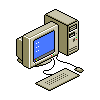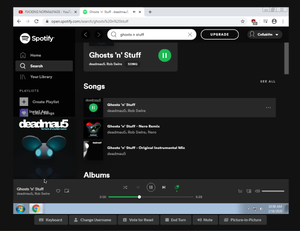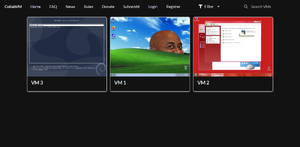CollabVM Server 2.0: Difference between revisions
m (1 revision imported) |
No edit summary |
||
| Line 24: | Line 24: | ||
==New Features== |
==New Features== |
||
*Memory leaks |
|||
*Memory leaks |
|||
*Memory leaks |
|||
*Did I mention memory leaks? |
|||
*Account registrations/username reservations. |
*Account registrations/username reservations. |
||
*Audio support. |
*Audio support. |
||
Revision as of 14:24, 8 July 2022
 |
This page references older versions of CollabVM 2.0, therefore, (some parts, or the entirety of) the information is irrelevant to the current version of the software. |
 | |
|---|---|
| Developer(s) | Cosmic Sans, Dartz |
| License | GNU General Public License v3.0 |
| Platforms | Windows, Linux, MacOS, BSD |
| Architectures | x86-64 (pre-built), x86, ARM |
| Release date | 17 February 2020 (deprecated 2 June 2020) |
| Successor | CollabVM Server 3.0 |


CollabVM Server 2.0 is an open source server that, as the name suggests, powers CollabVM, its variants, and some of its mirrors (although most remain on CollabVM 1.x). CollabVM 2.0.0 was released on February 17, 2020.
CollabVM Server 2.0 currently runs on Windows, Linux, macOS, and BSD, but binaries must be built manually on the latter two.
Sections
New Features
- Memory leaks
- Memory leaks
- Memory leaks
- Did I mention memory leaks?
- Account registrations/username reservations.
- Audio support.
- Official Windows 7/Server 2008 R2+ support (experimental support available in 1.2 as well).
- RDP and VNC support (RDP support is for VirtualBox, other software will likely work fine).
- Support for QEMU, VMWare, and VirtualBox. Anything with VNC/RDP support will work (even real machines).
- Your UserVMs can now be put in the CollabVM homepage.
Automated builds
Another new feature of collab-vm-server 2.0 is that it now has automated builds, meaning that collab-vm-server 2.0 binaries will be automatically built so you don't have to compile it yourself. You can download automated builds of collab-vm-server 2.0 from the following locations:
- Github releases (recommended)
Minimum Requirements
- RAM:
- Linux and Windows: At least 512 MB of free RAM on the server (Recommended: at least 2GB)
- Processor:
- Any mid/late-2000s processor or newer (Recommended: Any modern CPU.)
- A processor with virtualization technology is not required by collab-vm-server, but most modern VM software requires it. VMWare and VirtualBox (since 6.0) require it, while QEMU and Bochs do not.
- Space: At least 200 MB of free space, preferably around ~5-10 GB of space for VMs
Operating Systems
BSD
FreeBSD, NetBSD, OpenBSD
- Will build, but the required dependencies must be compiled or installed manually as vcpkg does not support these operating systems.
Linux
Any Linux distro running at least Linux Kernel 2.6.x will run collab-vm-server 2. So instead this page will list the minimum versions it will run on, and the minimum version you will need for support from the Developer team if you run into any problems.
Arch Linux
- Minimum: Arch Linux 0.6
- Recommended: Any modern Arch Linux install with all packages updated
An Arch Linux version from at least January 2020 is needed for full support.
CentOS
- Minimum: CentOS 4
- Recommended: CentOS 8
CentOS 6 or newer is required for full support.
Debian
- Minimum: Debian 3.1
- Recommended: Debian 10
Debian 8 or newer is required for full support.
Gentoo
- Minimum: Gentoo Linux 2004.0
- Recommended: Any modern Gentoo version
Gentoo 17.0 or newer is required for full support.
Ubuntu
- Minimum: Ubuntu 4.10
- Recommended: Ubuntu 18.04
Ubuntu 16.04 or newer is required for full support.
MacOS
- Minimum: Mac OS X 10.9 Mavericks
- Recommended: macOS 10.15 Catalina
At least macOS 10.12 "Sierra" is required for full support.
Windows
- Minimum: Windows XP SP2, or Windows Server 2003 Service Pack 2.
- Recommended: Windows 10 Version 1909, or Windows Server 2019 build 17763
Windows Desktop: At least Windows 7 SP1 or newer is required for full support.
Windows Server: At least Windows Server 2008 R2 SP1 or newer is required for full support.
The pre-built binary does not run on Windows XP. It requires at least Windows Vista SP2. If you want to run CVM Server 2 on XP, you must build it yourself with the VS 2017 XP Toolchain.